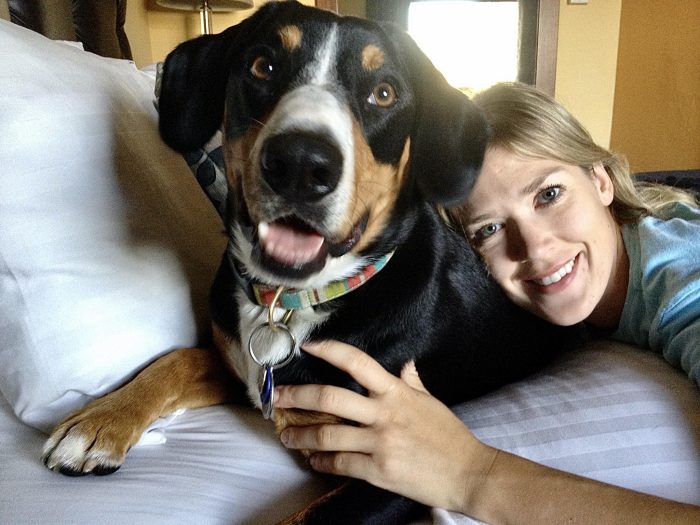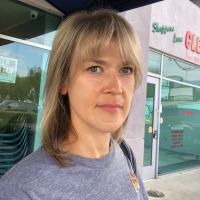We all have a thing. Mine? I always expect the worst.
My husband doesn’t answer the phone? He’s probably dead. My childhood friend didn’t message me on my birthday? Definitely dead. The gardener didn’t show up to blow the leaves? Very dead. The only way I can be sure someone’s not dead is to have them right in front of me.
Sadly, my husband has to go to work and my best friend lives 6,000 miles away in Western Siberia. The only creature that has yearned for my around-the-clock surveillance was our dog, Spoon.
An Entlebucher Mountain Dog—imagine an oversized Corgi with a Beagle’s face—Spoon was what they call “a lot of dog.” From day one, he stalked me around the house issuing a deafening bark at every outside noise. He nipped at my jeans, driven by an ancient herding instinct, and he tried to chest-bump our docile cats.
A Google search revealed that Entlebuchers need a job, or, worst-case scenario, they’ll eat the cats (and I like my cats). So, I went ahead and signed Spoon up for a local dog agility class.
You’ve seen it before—likely at 3 a.m., on Channel 149. An athletic canine navigates through a numbered obstacle course, directed by a considerably less agile human, aka the “handler.” The stoic judge closely observes the run, calling faults and bestowing points.
Held indoors, our first agility class was amateurish and low stakes. The instructors had no agenda to turn their students into the next National Agility Champion. My only objective was to tire out a dog, but instead, I accidentally gave his life meaning.
Soon, Spoon’s erratic behavior gave way to a wise, contained presence punctuated by only an occasional bark. The cats descended from their cat trees and roamed the house like antelopes without their natural predator. My remaining pair of jeans stayed intact.
Within a year, Spoon reliably crushed Thursday’s “Agility League,” and it was time for us to turn pro. I put my social life on pause and fully gave in to my calling of becoming a cuckoo Dog Sports Aficionado.
Every weekend, Spoon and I would get up at the crack of dawn, hop in my dented Prius, and head to a destination like City of Industry, California, where we would settle on the bleachers to watch born-to-run Border Collies, bear-like Bernese, and peppy Papillons, as they were shredding the course.
Then, our turn would come, and for a handful of seconds, the world would go out of focus, leaving nothing but my dog, kicking the cloud of dirt, tongue flipping in the wind. When we messed up, it was usually my fault.
No matter, even when we didn’t qualify, we had a blast. Spoon lived for the sport. He whimpered every time we pulled up into the parking lot, charged toward the ring like a young bull, and howled at me at the start line basically calling out, “Can we go already?!”
I never came to love agility the way Spoon did. What kept me coming back was the deepening of our bond. My husband rolled his eyes: “You two are the same.” I liked hearing that. I also liked that I no longer pictured my husband dropping dead at work—my brain was too busy visualizing winning ribbons.
Within a few years, my commitment to dog sports yielded unexpected results. Spoon became the number one agility dog in his breed, nationwide. His skills and discipline led him to work behind the scenes of a high-profile TV hit. He was even written up in American Kennel Club’s publication, to the chagrin of his dog show frenemies.
Then suddenly, Spoon lost the ability to walk and was diagnosed with aggressive bone cancer in his spine. My husband and I scavenged for all the options until there was only one option left. It was time for me to say goodbye to my unstoppable partner in dog sports.
We saw Spoon off on an unusually windy Los Angeles night. He faded, licking a peanut butter-filled rubber Kong, while my husband and I were holding him and singing to him. After the first euthanasia shot, while Spoon could still hear us, I whispered to him a few commands, sending him off on his final agility course. The second shot had stopped his heart.
My dog’s death crushed me. I couldn’t write or eat or tie the proverbial shoes. One night, my husband found me crouching on the kitchen floor, clasping onto the urn with Spoon’s ashes like some non-homicidal Medea. Instead of walking over and giving me his usual uplifting spiel, he mumbled something about getting fresh air and made a beeline for the front door. I watched him leave.
Was I turning into an emotional vampire? Maybe this wasn’t just about Spoon anymore. Maybe I was processing another, deeper loss, from when I was 16 years old, back in my hometown in Siberia.
I’ll never forget that day: the outside temperature was negative 40. I sat eating mealy potatoes dipped in sunflower oil with a pinch of salt. My mom was reclining on the couch, dressed in the faded cotton nightgown that she wore around the clock.
The phone rang. Mom picked it up.
Then, her voice cracked and became unusually high-pitched: “Dead? He’s dead?!”
I knew immediately from her reaction she was talking about my father.
Mom collapsed on the couch, wailing. I spit the half-chewed potato back on the plate and promised myself I wouldn’t cry. There was room for only one to grieve, and my mom had called dibs on it.
I should have been weeping too. After all, Dad was my favorite person. He taught me how to read, speak broken English, and play chess. A coal mining engineer on the verge of getting his dissertation, he used to wear neat ill-fitting suits, smelled of pungent cologne, and drew me pictures of bunnies. He would only get drunk every other month or so, nothing to write home to your babushka about.
Then, Dad had a falling out with his mentor, a distinguished member of the still powerful Communist Party. The dream of dissertation had been squashed, and with it, the hopes of a sizable government-issued new apartment, steady paycheck, and with it, a tolerable marriage.
Worst of all, Dad’s drinking took a dismal turn, even by Russian measures. He would forage the cabinets for a hidden bottle of vodka or cheap wine or the cologne that once resided on his skin—anything to dull the Dostoevsky-level pain of self-loathing. Mom tried to make him stop, but who could stop a force of nature?
Eventually, Dad gave up on people and civilization and moved to live a hermit’s life deep in the thicket of taiga where he could drink in peace. He’d visit every few weeks, looking less and less like my father, carrying a sack of gnarly beets and potatoes he’d farmed with his freshly callused hands. We had nothing to talk about—and I started drawing my own bunnies.
And now, he was dead. Dad’s neighbors discovered his frozen corpse in the pile of snow outside of his dilapidated farmhouse. He had been drinking and had a heart attack. According to the coroner, if Dad had survived, his limbs would have had to be amputated.
Two days later, my mom, now a ruin of a human being, had an idea.
“Dochka, you’re not going to the funeral. It’s too far, too cold,” she told me.
That wasn’t the main reason and we both knew it. It was Mom’s offer to help preserve me in my tearless state. With no mental image of my father’s corpse, the idea occurred to me I could skip over the whole grieving process—I agreed in a heartbeat.
Over the last several years, I’ve lived in Los Angeles where I’ve shed some of my Siberian thick skin and gone semi “woo-woo” with LA’s ever-permeating yoga and meditation. I’m yet to achieve enlightenment, but I have become aware of one thing: I never got to cheat the grieving process. Instead, I harbored it close to my heart, allowing it to shape me into a fretful person filled with survivor’s guilt. And now, with Spoon’s death, I was finally feeling it all.
Here’s how it would go. I’d be laughing about something with my husband, then suddenly, a thought would strike me: laughing is just a way for me to ignore the fact that Spoon is gone. Oh, and you know who else is gone? My dad—who never got to hear me singing to him off-tune on his deathbed, or to have a deathbed. Laughing, then, was an act of betrayal, a selfish attempt to feel joy in the face of the universe’s ultimate truth.
But then—the same day—I’d stumble on a loose agility ribbon, or a picture of Spoon, levitating over a jump, his expression that of pure bliss, and realize that the only way to challenge death is to live full throttle, whether by clearing a 20-inch jump or laughing your heart out.
Eventually, I learned to integrate both losses into the multitude of experiences that comprise me. I now allow myself to cry—about Dad or Spoon. Afterward, I saddle up and go off living.
Don’t get me wrong, I’m not comparing the loss of a parent to that of a pet. But my dog’s final gift was giving me the space to grieve. Not only his death, or even my dad’s death, but all the time I’ve lost being terrified of death when I could be doing life.
There’s a small silk pouch sitting on my writing desk. Inside it is a fistful of soil from my dad’s grave. For decades, I hid it in the drawers, afraid that seeing it would send me off onto an endless loop of anxiety.
Now, from time to time, I pick it up and hold the slinky fabric in my palm. It brings me comfort. I had a dad. He is still with me.









Read 6 comments and reply